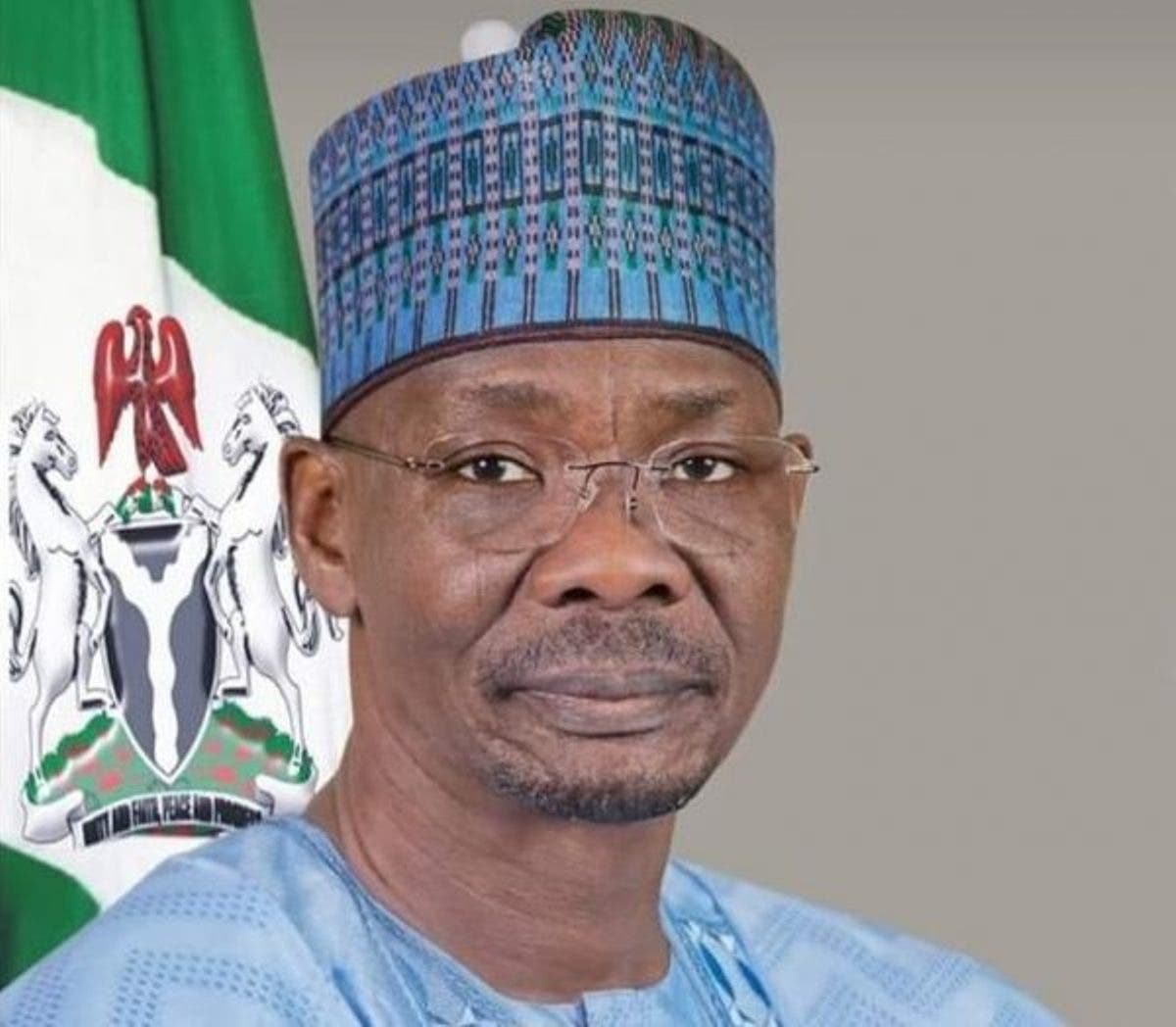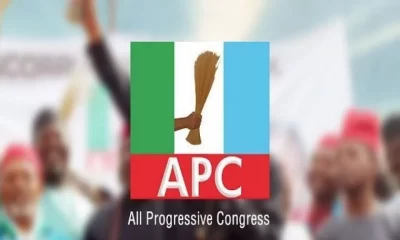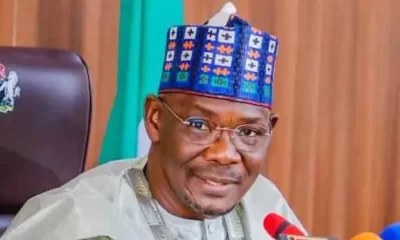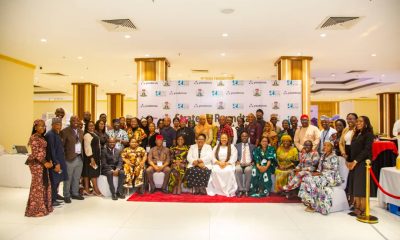BUSINESS
Nasarawa Gov, Sule Commissions N2bn Karu Retail, Recreational Centre

Nasarawa State Governor, Abdullahi Sule, on Thursday performed the groundbreaking ceremony of the Karu Retail and Recreational Centre to boost economic activities around the Abuja corridors.
The N2 billion project located at the Muhammadu Buhari International Market Karu, Karu Local Government Area is joint venture between the state government and The Mall company under a Public Private Partnership (PPP) arrangement.
Sule said that the project was a dream come true and in line with the Nasarawa Economic Development Strategy (NEDS) document, his administration’s development blueprint for the state.
The governor said his administration had leveraged the proximity of Karu to Abuja, the Federal Capital Territory (FCT) to attract several investments for the socioeconomic development of the state.
According to the governor, the Karu Retail and Recreational Centre is a significant offering both for economic and social impact on the state as it had already attracted a retail industry giant, ShopRite.
Sule expressed optimism that the project would create job opportunities for the teeming youth in the state.
He said that the project would be an architectural masterpiece that would not only transform the landscape of the area, but would improve the infrastructural development rating of Karu and attract more attention to the Muhammadu Buhari International Market.
The governor pointed that, being an investor and coming from the private sector, it was difficult for his administration to watch while the Muhammadu Buhari International Market, located in a prime location, is not being utilised in order to generate revenue for the state.
“The mall is therefore, critical to unlock the Nasarawa potential and build a self sufficient economy that allows citizens to strive, to compensate the hardworking, protect the vulnerable and sustain what we have for the future generation,” Sule said.
The governor promised that government would build a world-class pedestal bridge to link the Centre with the modern bus terminal, fitted with electronic advertisement platform that would generate additional revenue for the state.
He urged both private and public sector investors to take advantage of the business climate and ease to doing in the state saying, “Nasarawa is no longer a civil service state but a destination for investment.”
Earlier, Mr Yahaya Yahaya, CEO of The Mall company, described the project as a well thought out development and business model, which promises to deliver sustainable return on investment for all the parties involved.
He said the project to be completed within One year, would feature ShopRite as the retail anchor and a well-balanced tenants mix of indigenous and international food retail chains.
Yahaya said it would also feature restaurants, electronic and gadget stores, fashion retailers, pharmacies and other line tenants.
He said that the Centre would also have an expansive recreational park and children’s playground, while retaining the ecological footprint of the site for the benefit of the people.
Yahaya maintained that the development of a modern retail and recreational park in Nasarawa was beyond building a shopping mall, but providing an opportunity for the agriculture sector to grow as food would move from the farm to shelf and to the table.
He thanked the state government and other stakeholders for the opportunity to be part of the development of the state.
Also, the Managing Director of Nasarawa Investment Development Agency (NASIDA) Mr Ibrahim Abudullahi said the project was a landmark partnership for the retail sector in the state.
He pointed out that Gov Sule was poised to revitalise the economy of the state through private sector participation.
Abdullahi, therefore, encouraged other investors to take advantage of the business – friendly environment created by the administration, to invest in Nasarawa State.
He said that NASIDA, as a one-stop-shop agency for investors in the state was always ready guide investors in order to ensure profitable investment in the state.
In a goodwill message, the Etsu Karu, Luka Baba, appreciated the governor for his development initiatives across the state.
The royal father thanked the governor for the significant change in the development of particularly Karu Local Government Area. (NAN)
BUSINESS
Electricity Supply Better off before Privatization – Consumers

Torough David, Abuja
Many electricity consumers in the Federal Capital Territory (FCT), said that electricity was more regular when it was being managed by the Federal Government.
The consumers, who reside in Kubwa, Kuje, Lugbe and Gwagwalada spoke in Abuja on Wednesday.
They said that the privatisation of the power sector was a good idea, but added that it was not working as they enjoyed more hours of supply when it was managed by Power Holding Company of Nigeria, (PHCN).
Privatization of the sector in November 2013, was an initiative of the Federal Government to transfer ownership and management of power assets to private entities.
The move was to improve efficiency, attract more investments, and enhance overall electricity supply.
Eleven Electricity Distribution Companies (DisCos) and six Generation Companies (GenCos) were formed after the sector was privatised.
However, the transmission arm of the sector was retained by the Federal Government.
The consumers said that electricity was more regular when it was managed by the government before privatisation of the sector.
Benjamin Okorie, a Civil Servant residing in Kubwa said that his area does not enjoy power supply for six hours in a day.
Okorie said that when PHCN was managing the power industry before the unbundling of the sector, it was stable and regular.
“I thought the unbundling of the sector into generation, transmission and distribution was to improve power supply.
“But from what we are experiencing now, it is getting worse by the day and we are paying more for electricity,’’ he said.
Maria Manza, a businesswoman also residing in Kubwa said that power supply was epileptic in her area.
Manza said that the area had been experiencing low shedding of power for more than three months, adding that some days they don’t even get supply.
Jonathan Onoja, resident in Lugbe, Federal Housing said that power supply was not regular in his area, adding that they hardly enjoy up to eight hours supply in a day.
According to him, with the privatisation of the power industry into three segments, I thought electricity will improve.
“With the privatisation of the power sector, I thought government was doing consumers a huge favour but to my greatest surprise electricity has not improved,’’ he said.
Julius Omogiafor, a businessman residing in Gwagwalada said that electricity was better off under government management.
Omogiafor said that when PHCN was in charge of power, it was more regular than when it is now managed by three bodies.
| ReplyReply allForwardAdd reaction |
BUSINESS
Small Business Owners Lament High Cost of Doing Business

Some business owners in the Federal capital Territory (FCT), have expressed concern over the high cost of doing business presently.
According to them, they are also experiencing low patronage as many residents can no longer pay for goods and services like before.
The business owners said on Wednesday in Abuja, that the cost of doing business was making life extremely difficult for them.
They said increased transportation, cost of living, inflation, and weakened purchasing power were some of the challenges affecting their businesses.
At the Apo Fish Market, Agnes Nwafor, a foodstuff dealer, said the current economic situation had dampened the usual weekend buzz.
“People who usually come to my shop to do bulk purchases no longer do that anymore. People now buy goods per time depending on their needs.
”So many others who come around enquire about the prices of the items and end up not picking anything,” she said.
Sani Abdul, a vegetable seller at the Apo market said he had cultivated the attitude of selling almost below his cost price just to turn-over and attract more customers.
He lamented that most of his customers now purchased things on credit paying up in two or three installments depending on the amount.
”With the low influx of customers to the market today, one will think that this is not even weekend.
“Some of my co-traders in the market sell a dust bin basket of tomatoes for between N10,000 and N12,000 but I sell for N9,500, just to attract customers.
“Most customers who come to the shop either want the price of the items slashed or want to buy the product on credit and I do not blame them,” he said.
He urged the government to come to the aid of citizens and find a lasting solution to the increasing cost of doing business in the country.
Ekaite Obong, who runs a restaurant at the Gudu market area, also decried high cost of doing business and poor sales.
Obong said:” it seems like the sales keep dropping every day, every week and every month. We are not making sales anymore due to high cost of products.
”Purchasing some food items now is like acquiring gold. Even items which the price ordinarily is supposed to decrease due to its season of cultivation have not declined.
“Thus, making the cost of food high, because we have infused a little profit to our sales. So I do not blame the customers who don’t turn out in mass at all.”
Obong urged the government to tackle inflation and strengthen the naira to reduce the cost of imported goods.
“We also need policies that help local farmers and producers too. If food items are affordable, cost of food will reduce and I am sure we will get more patronage,” she said.
Similarly, Chinedu Umeh, who runs a fabric store said the situation in the country had affected both his wholesale and retail business.
“The economy is biting hard, cost of transportation is killing our businesses. The government really needs to look into this area and find a lasting solution,” he said.
Umeh suggested tax relief for small businesses and better access to credit financing to help cushion the impact of reduced sales.
“Small businesses are the engine of the economy, but we are sinking. Government must listen to us, and come to our aid,” he said.
Owoicho Ameh, who owns a farm along airport road, also decried the high cost of doing business and low sales.
Ameh said: “it is no longer business as usual for us these days as the cost of chicken feed, electricity and even transport is challenging our business.
“We struggle with these factors even with our little resources, yet, at the point of sale, customers are either not willing or able to buy.
“This is because, when we factor in our cost of production, it leads to increased cost of the birds, making many customers not able to afford it.”
Ameh said on several occasions, he sold his birds at giveaway prices, just to make sales and get funds to take care of family responsibilities.
He lamented that if he continued in that manner, he may likely go out of business in the nearest future and become jobless.
“The government sincerely needs to take urgent steps to improve the economic climate, improve infrastructure and boost the people’s confidence.
“If this is not given immediate attention, the rate of suicides is bound to increase in the country and the number of jobless citizens will increase,” Ameh said.
BUSINESS
FG Inaugurates CNG Buses to Boost Staff Welfare

The Federal Government has reiterated its commitment to institutional performance and staff welfare with the inauguration of Compressed Natural Gas (CNG) buses at the Federal Ministry of Finance in Abuja
This was contained in a statement by the Director, Information and Public Relations of the ministry, Mohammed Manga.
Meanwhile, the Minister of Finance and Coordinating Minister of the Economy, Wale Edun, while inaugurating the buses, announced the reintroduction of essential provisions for the staff.
Edun described the move as part of a broader push to energise the ministry’s workforce and improve operational efficiency.
He said that the ministry’s internal strength was vital to delivering Nigeria’s broader economic reform agenda.
“This ministry is the engine room of national transformation and that engine must be well-fuelled,’’ he said.
He said that the buses were acquired under the presidential initiative on CNG, which intends to ease staff transportation while advancing the country’s shift to cleaner, cheaper energy sources.
The minister said that the initiative aligned with the ministry’s values of fiscal prudence, transparency and environmental responsibility.
Edun underscored the critical role of staff welfare in delivering Nigeria’s economic reform agenda.
He announced the revival of monthly welfare provisions to staff, a practical gesture aimed at fostering morale and stability as the ministry leads the charge on macroeconomic reform.
The Permanent Secretary of the Ministry, Lydia Jafiya, urged the staff to remain committed, disciplined and professional as the ministry continues to steer the country through a period of economic transition.
“As the country pursues tough but necessary policy shifts ranging from treasury digitalisation to market stabilisation, the ministry’s internal unity and external credibility remain pivotal to achieving inclusive growth and restoring investor confidence,” she said.
Jafiya also commended the minister’s leadership and hard work.
The Chairman of the Presidential Initiative on CNG, Ismaeel Ahmed, reiterated the programme’s mission to mainstream cleaner transport across government institutions and stimulate local industrial value chains.
| ReplyReply allForwardAdd reaction |





























